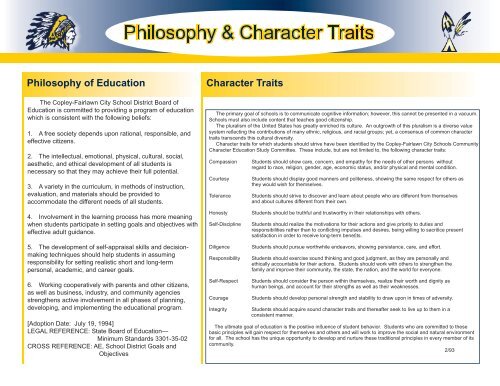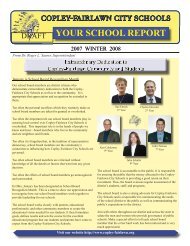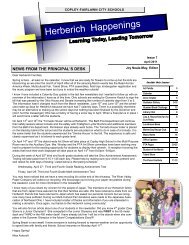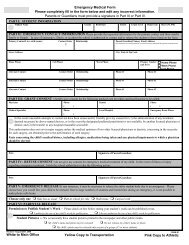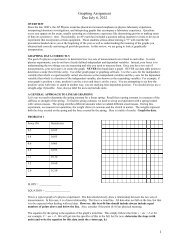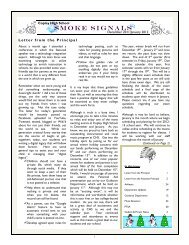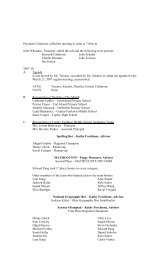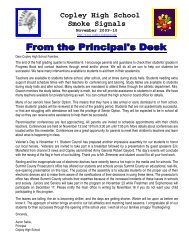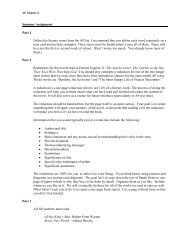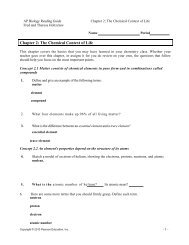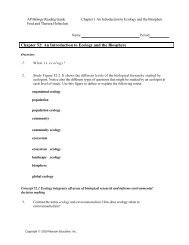2012-2013 District Activity Calendar - Copley-Fairlawn City Schools
2012-2013 District Activity Calendar - Copley-Fairlawn City Schools
2012-2013 District Activity Calendar - Copley-Fairlawn City Schools
Create successful ePaper yourself
Turn your PDF publications into a flip-book with our unique Google optimized e-Paper software.
Philosophy of EducationThe <strong>Copley</strong>-<strong>Fairlawn</strong> <strong>City</strong> School <strong>District</strong> Board ofEducation is committed to providing a program of educationwhich is consistent with the following beliefs:1. A free society depends upon rational, responsible, andeffective citizens.2. The intellectual, emotional, physical, cultural, social,aesthetic, and ethical development of all students isnecessary so that they may achieve their full potential.3. A variety in the curriculum, in methods of instruction,evaluation, and materials should be provided toaccommodate the different needs of all students.Character TraitsThe primary goal of schools is to communicate cognitive information; however, this cannot be presented in a vacuum.<strong>Schools</strong> must also include content that teaches good citizenship.The pluralism of the United States has greatly enriched its culture. An outgrowth of this pluralism is a diverse valuesystem refl ecting the contributions of many ethnic, religious, and racial groups; yet, a consensus of common charactertraits transcends this cultural diversity.Character traits for which students should strive have been identifi ed by the <strong>Copley</strong>-<strong>Fairlawn</strong> <strong>City</strong> <strong>Schools</strong> CommunityCharacter Education Study Committee. These include, but are not limited to, the following character traits:Compassion Students should show care, concern, and empathy for the needs of other persons withoutregard to race, religion, gender, age, economic status, and/or physical and mental condition.Courtesy Students should display good manners and politeness, showing the same respect for others asthey would wish for themselves.Tolerance Students should strive to discover and learn about people who are different from themselvesand about cultures different from their own.4. Involvement in the learning process has more meaningwhen students participate in setting goals and objectives witheffective adult guidance.5. The development of self-appraisal skills and decisionmakingtechniques should help students in assumingresponsibility for setting realistic short and long-termpersonal, academic, and career goals.HonestySelf-DisciplineDiligenceResponsibilityStudents should be truthful and trustworthy in their relationships with others.Students should realize the motivations for their actions and give priority to duties andresponsibilities rather than to confl icting impulses and desires, being willing to sacrifi ce presentsatisfaction in order to receive long-term benefi ts.Students should pursue worthwhile endeavors, showing persistence, care, and effort.Students should exercise sound thinking and good judgment, as they are personally andethically accountable for their actions. Students should work with others to strengthen thefamily and improve their community, the state, the nation, and the world for everyone.6. Working cooperatively with parents and other citizens,as well as business, industry, and community agenciesstrengthens active involvement in all phases of planning,developing, and implementing the educational program.[Adoption Date: July 19, 1994]LEGAL REFERENCE: State Board of Education—Minimum Standards 3301-35-02CROSS REFERENCE: AE, School <strong>District</strong> Goals andObjectivesSelf-RespectStudents should consider the person within themselves, realize their worth and dignity ashuman beings, and account for their strengths as well as their weaknesses.Courage Students should develop personal strength and stability to draw upon in times of adversity.Integrity Students should acquire sound character traits and thereafter seek to live up to them in aconsistent manner.The ultimate goal of education is the positive infl uence of student behavior. Students who are committed to thesebasic principles will gain respect for themselves and others and will work to improve the social and natural environmentfor all. The school has the unique opportunity to develop and nurture these traditional principles in every member of itscommunity.2/93


